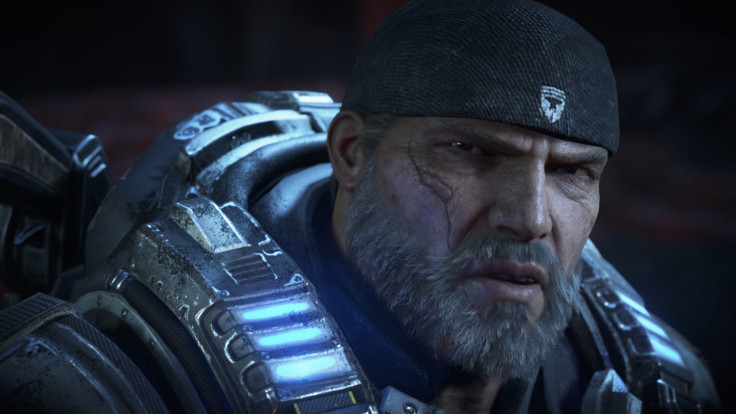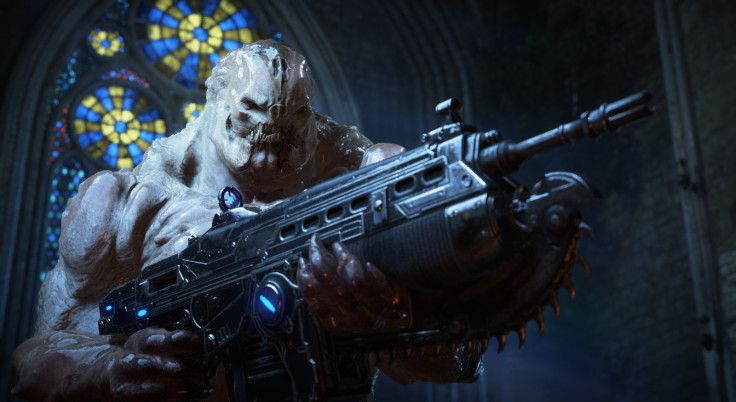Gears of War 4 director on taking over Epic's series and learning from Halo devs 343 Industries
Creative director Chuck Osieja discusses stamping their authority on Epic Games' classic series.

Gears of War is the latest iconic series of the Xbox 360 and PS3 generation to make its full debut on current consoles. Like its Xbox sibling Halo, it too is under new management, with The Coalition taking over from Epic Games after Microsoft bought the license in 2014.
Taking the action 25 years into the future, Gears of War 4 brings in a cast of new faces and a raft of new gameplay features, but retains what made the original Gears trilogy such a delight to play from 2006 to 2011.
Taking over such a hugely popular series isn't easy though, so IBTimes UK spoke to Gears of War 4's creative director Chuck Osieja about the process and bringing the series to Xbox One.
IBTimes UK: Where did you start with the project? Was it the gameplay, or the story, or the characters?
Chuck Osieja: We started on educating the studio on what building a Gears of War product meant. For us, it was really about doing a boot camp on Gears of War. What we did is we went back and deconstructed encounters and enemies and weapons from the previous games, to understand exactly how they worked, because Gears is a deceptively simple game where it looks like all you do is go into cover and shoot things, but there's a reason why no one's been able to create a replica of Gears that's as tight an experience. It's because those seemingly very simple elements, all work together in a very specific way.
Whether it's the encounter distance of an enemy or what an enemy brings to a fight or what an enemy's role is during a fight, and even as far as what that role of the weapon is inside of a fight as well. We started by actually deconstructing everything, rebuilding a bunch of those things, and as soon as we could rebuild them, the way that they existed in the previous games, then we started to make them better. The goal for the studio has always been do it right before we do it differently. Part of that was just about the education process of, "Hey, how do you make a Gears of War game feel like a Gears of War game has always felt and then where do you take it from there?"
What's been the most difficult aspect of developing a game that has got this storied history with another developer?
I think the most difficult thing for us has been the Gears of War trilogy really ended the storyline of the Locust. The hardest thing that we had to deal with at the beginning is, "Hey, what do you do next?" Spoiler alert: at the end of Gears of War 3 all the Locust die. That story has sort of ended. What do you do? Do you go back in time and tell Emergence Day, do you go tell the Pendulum Wars, or do you do what we did, which is take in the future and say, "Okay, we're going to tell a new story, with a new group of characters, with a new enemy, and try and go from there." It's been a lot of fun, but it's also a bit nerve-wracking, because you don't know how people are going to respond to it.
Were you conscious of striking a balance between the need to stamp your own authority on the series, also respecting what Epic had created?
For sure. The cool thing is, is that when we acquired the franchise, part of that was an early partnership with Epic. We were able to sit down with a bunch of guys from Epic, including... having Rod Ferguson on the team and leading the studio has been a huge help because he has all that tribal knowledge of what a Gears game is really all about, so being able to sit there and ask him, "Why did you do this?" or Why don't you do this?" or "Why don't characters jump?" There are a bunch of questions that people have that when you get a chance to talk to people that have been involved in the franchise for ten years, you start to understand, "Okay, what were they going for and why did they do this?"
For us, putting our stamp on it has been an evolution of that starting point of, "Hey, let's make it feel right." The highest compliment we got was the first time we showed the game and the review to Phil Spencer. He played it, and he said, "This feels like Gears." We patted each other on the back and go, "Thank you, that's the best thing you could say." Because if the fans don't feel like that this feels like a Gears of War game, it doesn't matter what we do differently. Then you can start to turn in a little bit and say, "Okay, here's the new things we're going to add," and that's how we approached it.

Will The Coalition stamp their authority on Gears of War further if there are to be more games down the line?
Chuck: Sure. I think so. For us again, it was... we had a great template in what 343 [Industries] did with Halo, right, because they took over a beloved franchise from Bungie. We were able to watch how they approached it, and what the feedback was and we were able to use that as a template for us to say, "Okay, let's make sure we let the fans know that we know what we're doing," and then as we started to put new things in, we see things, whether it's the weapons or it's the enemy types or even the way that the environments work, or the story flows, things like that. That's all The Coalition stamp on it. That now becomes the starting point for the next one and the next one and the next one after that.
Did you discuss things with 343, did you meet with them?
Yes we have a great relationship with those guys, we talk to them. We were able to see at arm's length exactly what they were going through, and be able to see how fans were reacting to it and what they were talking about, the things they cared about. So for us, watching them successfully navigate that minefield, and come out on the other side when people said, "Oh my God, Halo 4 is great," for us that is a really good template to be able say, "Okay, let's make sure that we're communicating with fans, that we're listening to what people care about and making sure that we're true to what Gears really is."
And it must be good seeing them do it and knowing it can be done, and done successfully...
Exactly. That's what the iteration is, that's what the whole development process is for, that's why we could do betas. That's why we do all these things. Part of our job is to go and talk to the fanbase. We've brought in players, we've brought in professional players. We had people early on, that were devoted fans of the franchise, feeding back on what we were doing. The feedback was constantly positive and they were like, "Oh yeah, we love this, we love this. Oh, are you going to fix this?" It was like, "Yeah, we already fixed that, so we're moving on to this thing over here." I think getting your community involved and having them feel like they can participate in it, is really important. They help guide is to where we want to go.
For all the latest video game news follow us on Twitter @IBTGamesUK
© Copyright IBTimes 2025. All rights reserved.






















